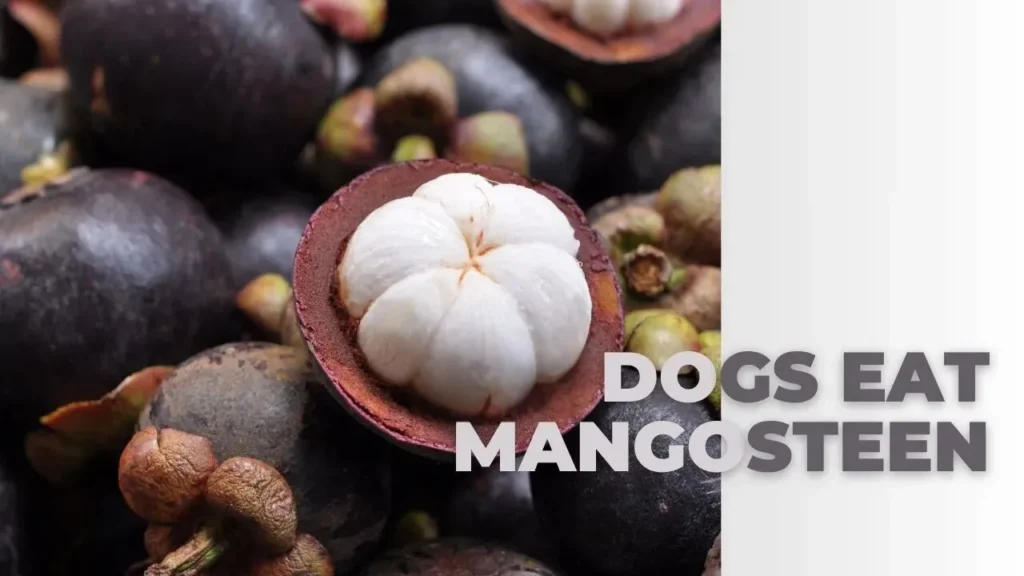Yes, dogs can eat mangosteen, and it can be a healthy low-fat snack for your furry friend. This exotic fruit is high in dietary fiber, which aids in smooth digestive processes. However, it’s important to note that mangosteen isn’t suitable for every dog—especially if your dog is diabetic. This contains a high amount of natural sugars, which could spike your dog’s blood sugar levels .As with any new food, it’s always a good idea to check with your veterinarian before offering it to your pet.
Is Mangosteen Safe for Dogs?
Yes, is it safe for dogs when served properly. This fruit is packed with nutrients that can benefit your dog’s health, but there are a few precautions to keep in mind. Like many tropical fruits, This is high in natural sugars, so it should only be offered in moderation. Also, remember to avoid feeding your dog the outer shell or seeds, as they could pose a choking hazard or cause digestive issues.
Benefits of Mangosteen for Dogs
This is rich in vitamins and antioxidants, both of which can support your dog’s immune system and overall health. Here’s how these fruit can benefit your dog:
Rich in Nutrients
Is it packed with essential nutrients like dietary fiber, vitamins, and minerals such as magnesium, calcium, phosphorus, and potassium. These contribute to overall health and well-being in dogs.
Antioxidant Properties
The fruit contains xanthonoids and other phytochemicals, which are known for their powerful antioxidant properties. These antioxidants help reduce oxidative stress, support your dog’s immune system and support healthy skin and fur. While many commercial dog foods contain antioxidants, a little extra from natural sources can be a great addition.
Low-Fat Snack
With its low fat content, it can be a healthy occasional treat for dogs that need to maintain or lose weight, provided it’s served in moderation.
Dietary Fiber
This tropical fruit is also a good source of dietary fiber, which can aid digestion and promote gut health in dogs. Fiber helps regulate bowel movements and can be beneficial for dogs with sensitive stomachs.
Risks of Feeding Mangosteen to Dogs
High Sugar Content: One of the main concerns with mangosteen is its high sugar content. If your dog is diabetic or prone to blood sugar issues, it’s best to avoid this fruit altogether. Even healthy dogs should only have it, make it a treat, not a regular part of your dog’s diet. Feeding too much can lead to weight gain or other health issues over time.
Choking Hazard: This fruit seeds pose a choking risk and may cause intestinal blockage if ingested. Always remove the seeds before offering the fruit to your dog.

Your dog’s health depends on proper nutrition and a balanced diet. Some fruits can be a healthy option for them. Learn more about which fruits and vegetables are safe for dogs. For a hydrating option that helps keep your dog feeling great, try dragon fruit.
How to Serve Mangosteen to Dogs
If you decide to feed this to your dog, it’s essential to do it the right way. Here are a few steps to safely serve this fruit:
- Remove the Outer Shell: The tough outer shell should never be given to your dog as it’s difficult to digest for both humans and dogs.
- Remove the Seeds: The seeds can be harmful, so be sure to remove them completely before serving.
- Once you’ve removed the seeds, break the fleshy segments into small, bite-sized pieces. Offer your dog a small portion to start with, and observe their reaction.
- Moderation is Key: This should be an occasional treat. Too much could lead to digestive issues or spikes in blood sugar levels.
Some dogs love the sweet, citrusy flavor, while others might not be so keen on it. It’s always a good idea to introduce any new food slowly and watch for any signs of an allergic reaction.
Watch for Any Signs of Allergic Reactions

Although is it is generally safe for dogs, there’s always a chance that your dog could have an allergic reaction to new foods. Common signs of an allergic reaction include itching, swelling, or gastrointestinal upset such as vomiting or diarrhea. If you notice any of these symptoms after feeding your dog, stop immediately and consult your veterinarian.
Moderation is Key
As tempting as it might be to share more with your dog if they love the flavor, it’s important to limit their intake. Due to its high sugar content, This should only be an occasional treat. Too much sugar can lead to dental issues, weight gain, and even diabetes in dogs over time. Stick to small amounts and treat like a special snack rather than a daily part of their diet.
Conclusion
Mangosteen can be a healthy and tasty snack for dogs when served properly and offered in moderation. It offers valuable nutrients, vitamins and antioxidants, but always be mindful of the sugar content. but it’s crucial to remove the seeds and avoid giving it to diabetic dogs. As with all human foods, moderation is essential to ensure your dog stays happy and healthy and every dog is different, so always check with your vet before adding new foods to their diet.
By following these guidelines, you can safely offer your dog this tropical treat without any worries! Have you ever shared this fruit with your dog? Did they love it, or were they indifferent to the tropical flavor? Let us know in the comments below!











No Comment! Be the first one.